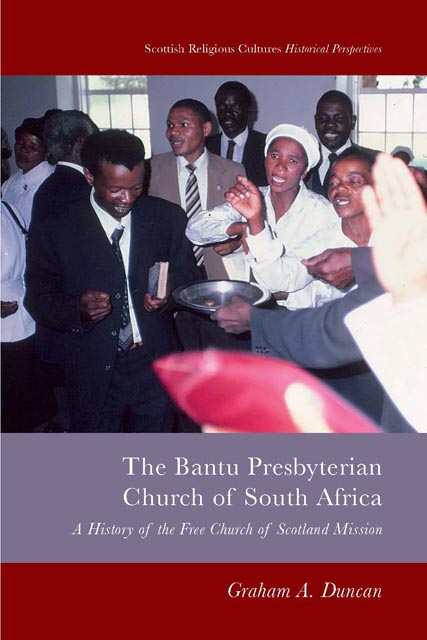Book contents
- Frontmatter
- Contents
- Acknowledgements
- Timeline
- A Presbyterian Anthem
- Introduction
- 1 Background to this Study
- 2 The Origins and Early Development of Scottish Presbyterian Mission in South Africa, 1824–65
- 3 Rev. Tiyo Soga (1829–71): A Paragon of Early Indigenous Leadership
- 4 The Role of Mission Councils in the Scottish Mission in South Africa, 1864–1923
- 5 The Rev. Edward Tsewu’s Dispute with the Free Church of Scotland Mission
- 6 The Mzimba Secession, 1898: A South African ‘Disruption’
- 7 Presbyterianism in South Africa, 1897–1923: To Unite orNot to Unite?
- 8 Preparations for the Formation of the Bantu Presbyterian Church of South Africa, 1897–1919
- 9 The Formation of the Bantu Presbyterian Church of South Africa, 1920–3
- 10 Mission to Church – Church to Mission: The First Ten Years, 1923–33
- 11 Reaching Out: The Bantu Presbyterian Church in South Africa and the Presbyterian Church of South Africa and Ecumenism, 1923–39
- 12 The Bantu Presbyterian Church in South Africa and Ecumenism, 1940–99
- 13 The End of Mission Councils: The Church of Scotland South Africa Joint Council, 1971–81
- 14 A Young Church in Mission or Maintenance Mode?: The Bantu Presbyterian Church of South Africa, 1923–99
- 15 The Bantu/Reformed Presbyterian Church and Socio-political Issues
- 16 Bantu/Reformed Presbyterian ChurchWomen in Leadership in Ministry
- Conclusion: Indigenous Presbyterians and Missionaries –Transferring Contending Roles and Responsibilities
- Bibliography
- Index
4 - The Role of Mission Councils in the Scottish Mission in South Africa, 1864–1923
Published online by Cambridge University Press: 26 November 2022
- Frontmatter
- Contents
- Acknowledgements
- Timeline
- A Presbyterian Anthem
- Introduction
- 1 Background to this Study
- 2 The Origins and Early Development of Scottish Presbyterian Mission in South Africa, 1824–65
- 3 Rev. Tiyo Soga (1829–71): A Paragon of Early Indigenous Leadership
- 4 The Role of Mission Councils in the Scottish Mission in South Africa, 1864–1923
- 5 The Rev. Edward Tsewu’s Dispute with the Free Church of Scotland Mission
- 6 The Mzimba Secession, 1898: A South African ‘Disruption’
- 7 Presbyterianism in South Africa, 1897–1923: To Unite orNot to Unite?
- 8 Preparations for the Formation of the Bantu Presbyterian Church of South Africa, 1897–1919
- 9 The Formation of the Bantu Presbyterian Church of South Africa, 1920–3
- 10 Mission to Church – Church to Mission: The First Ten Years, 1923–33
- 11 Reaching Out: The Bantu Presbyterian Church in South Africa and the Presbyterian Church of South Africa and Ecumenism, 1923–39
- 12 The Bantu Presbyterian Church in South Africa and Ecumenism, 1940–99
- 13 The End of Mission Councils: The Church of Scotland South Africa Joint Council, 1971–81
- 14 A Young Church in Mission or Maintenance Mode?: The Bantu Presbyterian Church of South Africa, 1923–99
- 15 The Bantu/Reformed Presbyterian Church and Socio-political Issues
- 16 Bantu/Reformed Presbyterian ChurchWomen in Leadership in Ministry
- Conclusion: Indigenous Presbyterians and Missionaries –Transferring Contending Roles and Responsibilities
- Bibliography
- Index
Summary
Introduction – Origin of Mission Councils
The role of Mission Councils in the growth and development of the Scottish Mission in South Africa is confusing and vexatious. Whereas these councils were conceived and established as a means of facilitating mission, they often hindered this by distinguishing between agents of mission, missionaries and indigenous leaders, and delineating spheres of authority through exercise of power, even in opposition to expressed mission policy initiated in Scotland. They were an integral part of the hegemonic missionary worldview which frustrated progress towards the formation of the Bantu Presbyterian Church of South Africa in 1923.
The history of Scottish Presbyterian church policy during the period 1898–1923 was largely influenced by a minute of the Foreign Mission Committee (FMC) of the Free Church of Scotland (FCoS) of October 1864 relating to South Africa, which stated:
That the ordained European missionaries reared in the colony or sent from this country be constituted into a Missionary Council for the regulation of the affairs of the Mission. (National Library of Scotland [NLS] MS 7801: 80, 81; cf. Brock 1974: 438. Appendix A: 2)
Mission Councils were formed for ‘the maintenance, administration or independence of our Mission in South Africa’ (Our Mission in South Africa, MS 14849, Rhodes University [RU], Cory Library). This minute resulted from Alexander Duff’s, Convener of the FMC of the FCoS, visit to Kaffraria in 1864, and the recognition of a need for change in the organisation of the Mission arising out of confusion that emanated from an earlier decision that ‘all matters connected with the management of the mission in Kaffraria devolve upon the Presbytery’. This included the affairs of missionaries, which meant that black ministers would have decision-making powers regarding missionaries. The implication of the 1864 minute was that Presbytery should keep to its ‘proper functions’, i.e. discipline, where relevant, but not those matters relating to missionary conduct or activity. Such matters should be determined solely by whites in the Mission Council. All bodies involved in the mission – Presbyteries, Mission Councils, Financial Board, and Educational Board of the Seminary – should communicate with each other concerning areas of mutual interest that fell within their remits; and that each should relate directly to the FMC on all matters requiring approval or confirmation.
- Type
- Chapter
- Information
- Bantu Presbyterian Church of South AfricaA History of the Free Church of Scotland Mission, pp. 44 - 56Publisher: Edinburgh University PressPrint publication year: 2022



